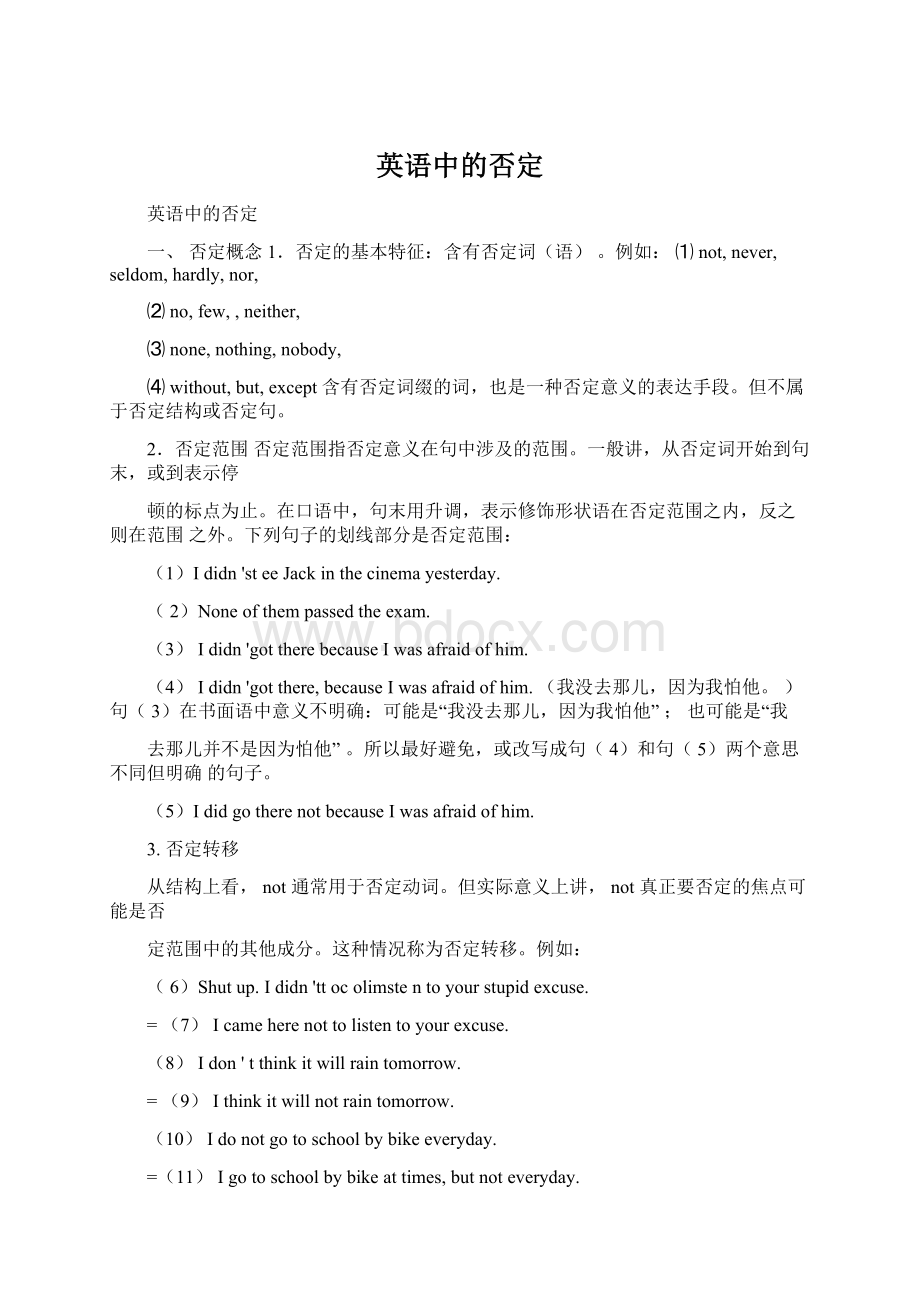英语中的否定.docx
《英语中的否定.docx》由会员分享,可在线阅读,更多相关《英语中的否定.docx(10页珍藏版)》请在冰豆网上搜索。

英语中的否定
英语中的否定
一、否定概念1.否定的基本特征:
含有否定词(语)。
例如:
⑴not,never,seldom,hardly,nor,
⑵no,few,,neither,
⑶none,nothing,nobody,
⑷without,but,except含有否定词缀的词,也是一种否定意义的表达手段。
但不属于否定结构或否定句。
2.否定范围否定范围指否定意义在句中涉及的范围。
一般讲,从否定词开始到句末,或到表示停
顿的标点为止。
在口语中,句末用升调,表示修饰形状语在否定范围之内,反之则在范围之外。
下列句子的划线部分是否定范围:
(1)Ididn'steeJackinthecinemayesterday.
(2)Noneofthempassedtheexam.
(3)Ididn'gottherebecauseIwasafraidofhim.
(4)Ididn'gotthere,becauseIwasafraidofhim.(我没去那儿,因为我怕他。
)句(3)在书面语中意义不明确:
可能是“我没去那儿,因为我怕他”;也可能是“我
去那儿并不是因为怕他”。
所以最好避免,或改写成句(4)和句(5)两个意思不同但明确的句子。
(5)IdidgotherenotbecauseIwasafraidofhim.
3.否定转移
从结构上看,not通常用于否定动词。
但实际意义上讲,not真正要否定的焦点可能是否
定范围中的其他成分。
这种情况称为否定转移。
例如:
(6)Shutup.Ididn'ttocolimstentoyourstupidexcuse.
=(7)Icameherenottolistentoyourexcuse.
(8)Idon'tthinkitwillraintomorrow.
=(9)Ithinkitwillnotraintomorrow.
(10)Idonotgotoschoolbybikeeveryday.
=(11)Igotoschoolbybikeattimes,butnoteveryday.
二、常见的否定手法
1.全句否定和局部否定(也称“一般否定和特指否定”)
1.1全句否定(generalnegation):
结构上not,never否定谓语或no否定名词。
(12)Theyarenotinterestedinthesesubject.
(13)Youcan'ttakethesebooksoutofthereadi-nrogom.
(14)Thereisnotimetobelost.
1.2局部否定(specialnegation):
not置于某个特定对象之前。
(15)Youmustalwaysremembernottobecomeconceited.
(16)Themoongivesnolightofitsown.局部否定用得很少,通常采用全句否定形式。
但可以通过否定转移来达到局部否定的目的。
例如,句(17)比句(18)更自然:
(17)Iwon'tstayhereforlong:
.
(18)Iwillstayherebutnotforlong.但有时用全句否定会产生歧义:
(19)Itdidn'trainallthemonth.
句末用升调,表示否定转移至状语:
是下雨了,但没有整整下一个月。
句末用降调时,not否定rain:
整整一个月没下雨。
如果将状语置于句首,原句改为Allthemonthitdidn',tr则ainallthemonth处于否定范围之
外,not只能否定rain,意思也就明确了。
采用局部否定也可避免类似的歧义。
例如:
(20)Itrainednotallthemonthbutforpartofthemonth.有时全句否定和局部否定意义全然不同:
(21)Hedidn'ttrytomentionittoTom.他不想对Tom提起这件事情。
(22)HetriednottomentionittoTom.他尽量不对Tom提这件事。
△否定的前缀、后缀也是一种局部否定,但从结构上讲,不属于否定句结构。
因此,在含有这类词的句子后,附加疑问句中用否定。
如:
Itisunimportant,isn'tit?
2.全体否定和部分否定2.1全体否定(absolutenegation)
含有no,none以及neither,never等否定词,或every,all与带有否定词缀的词连用时,均为全体否定:
(23)Noonecandoit.
(24)Neitherofthesistersisgood-looking.
(25)Allthesestarsareinvisibletonakedeyes.
(26)Everyplanhehasmadeinimpossibletocarryout.
(27)Ilookedeverywhereforthecellphone,butitcouldbefoundnowhere.2.2部分否定(partialnegation)
not与下列词语连用时,具有部分否定意义:
both,all,every,every-,always,entirely,wholly等。
例如:
(28)Idon'twhollyagreewithyou.
_(29)Allthatglittersisnotgold.
(30)Bothofhisparentsareathome.
(31)Noteverythinghesaysisright.但这些词语否定的前缀连用时,意为全部否定。
如:
(32)Allthisisunnecessary.
3.双重否定和重复否定
3.1双重否定(doublenegation)双重否定时止,同一结构中用一个否定词否定另一个否定词(也包括否定前缀词)。
两个否定词互相抵消。
双重否定通常强调一个肯定的意思。
(33)Hedoesn'tlendhisbookstonobody.
(34)Idid'tdoitfornoreason.
(35)Wearenotunpreparedfortheoutcomeoftheconference.
(36)Henevercamewithoutaskingformoney.
(37)Icannotbutadmirehiscourage.
(38)Theycouldn'thelplaughingajotkthee.
3.2重复否定(repeatednegation)重复否定是指用两个(以上)的否定词连续否定一个意思,所以就加强了否定的意义。
其一般形式是:
否定的谓语+否定的宾语;否定的主语+否定的谓语:
(39)Idon'tknownothingaboutthematter.=(Idon'tknowanythingaboutit.)
(40)Wewon'tlosenothingbyi=t.W(ewon'tloseanything)
(41)Nobodyhardlytooknoticeofhim.(=Nobodytooknoticeofhim)重复否定在早期英语里很普遍,因为词的重复是正常的修辞手段。
在现代英语里,不是标准语言。
但在口语中仍不少。
尤其是教育程度不高的人群中。
4.延续否定(resumptivenegation)
△用not⋯not/neither/nor
(42)I'llnotdosuchathing,not同I.一(主语)
(43)Youcannotdoit,norcanI,norcananyoneelse.(不同主语)
(44)ButOliverdidnotcomethatday;northenextday,;northenextafterthat;norformany,manydaysafter.(连续否定多个状语)
(45)Itwasnotsurprise,nordisappointment,noranger,notanyoftheexpressionsthatDellahadbeenpreparedfor.
△用tosaynothingof,nottomention,nottospeakof,letalone,stillless,muchless+名词(后三个短语也可接动词),表示“(连⋯都不⋯,)更别说⋯了。
”
(46)Hedoesn'tlikemusic,stilllessdancing.
(47)HedoesnotspeakEnglishwell,tosaynothingofGermanorFrench.
(48)Shecan'taffordtobuyabicycle,letaloneacar.(CIDE)
(49)"Areyougettinganewcarthisyear?
""Youmustbejoking!
Ican'taffordtopaymybills,letalonebuyanewcar!
"(CIDE)
(50)AttheageoffourteenIhadneverevenbeenonatrain,much/stilllessanaircraft.
5.半否定(semi-negation)
用hardly,seldom,rarely,scarcely,few,little,almostnot/no;
(51)HeseldomwentoutonSundays.
(52)Itishardlypossible,isit?
(53)Fewbelievedit,didthey?
(54)Heisinterestedinalmostnothingexceptcomputergames.
6.排除否定(excludednegation)
用all⋯but,every⋯but,anything等b。
ut
(55)AllthepeopleatthemeetingagreedbutJack.
(56)I‘dliketodoeverythingexcepthousework.
(57)Heisanythingbutagoodteacher.
在否定句中用but/except则成了肯定的意思:
NobodyexceptBillc